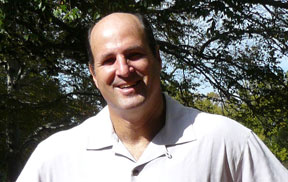Robbins Inspires Writers at Alma Mater
With seven published novels, an eighth due out in January, and a ninth in the works, bestselling novelist David Robbins ('76, J.D. '80), has won accolades as an author. As this year's Scott and Vivian Donaldson writer-in-residence at the College, Robbins seeks to inspire aspiring writers.
A graduate of both the College and the Law School, Robbins, referencing an approach he attributed to the late William Styron, author of Sophie's Choice, enjoys trying to "entertain, educate, and elevate, all in equal proportions." He said that he feels "very honored" to have been selected to teach a fiction writing seminar this year as part of William & Mary's longstanding writers in residence program.
"I like teaching," Robbins said, explaining that he enjoys "taking the mythos out of getting published." He also finds that his students motivate him to improve his own writing. "When I sit down to write every day, the drums that are beating in that classroom are really resounding in my head," said Robbins. "I like the class--I like being part of their struggle," he said.

Students fortunate enough to study under Robbins this semester praised Robbins for his energetic approach to teaching.
"He gets very involved with students and works with us on anything we bring to him," Ben Farthing, a junior, said in a telephone interview. "He [has] taught me to say what I mean in the most artful and succinct way," he said.
Professor Nancy Schoenberger, who chairs the writer-in-residence committee, said that the "glowing" reviews of Robbins' former students definitely factored into the committee's selection of Robbins as the College's 27th writer-in-residence.
"Among our creative writing core faculty, we look at writers who we know, good writers, writers who have some experience, writers who have the desire to teach for us," Schoenberger said.
Schoenberger said she has received unusually positive feedback from Farthing and other students enrolled in Robbins' popular fiction writing class. "David is a very dynamic personality and a very involved teacher," she said.
Because William and Mary does not have a full time tenured fiction writer, the writer-in-residence program seeks to fill the void by rounding out the English department?s course offerings.
"It brings in a fresh perspective every year," Schoenberger said, noting that the program also brings "a little bit of prestige to our department." Aware of Robbins' commercial success, the committee hoped that Robbins would offer students "a sense of what of what the marketplace is like," she said.
Several novels by Robbins have appeared on the New York Times bestseller lists and his book War of the Rats was nominated for an Audie award. Robbins has traveled as far afield as Russia and Cuba while researching his novels, which include The Assassins Gallery, Last Citadel, and The End of War. He said that driving a truck across Europe in preparation for Liberation Road gave him crucial insight into the grueling side of war.
At a public reading held on campus on Oct. 23, Robbins read selections from The Betrayal Game, which will land on bookstore shelves in January, and a novel on Chernobyl that he is currently writing.
Robbins is the second William & Mary alumnus hired as a writer-in-residence since the English department created the program in 1971. Schoenberger, who first came to William & Mary as a writer-in-residence in 1989, said that the fact that Robbins holds two degrees from the College is "an added bonus."
Reminiscing about his Tribe years, Robbins said that although he only practiced law for 50 weeks after graduating from law school, he learned valuable critical thinking skills that have made his writing more technically grounded and his language more precise. He readily acknowledged, however, that his "creative bent" eventually led him to become a novelist.
"If I had to advise a young law student, I would say restrain your creative bent until you are on your own," Robbins said.
Asked what advice he would give to aspiring fiction writers in general, Robbins compared the writing process to an isosceles triangle, with the wide base of the triangle formed by "hard work, repetition, and discovery of your own voice."
"You can be an artist when you write but you have to be a technician when you edit," Robbins said. As a teacher, Robbins has allocated less than one hour of class time to plot development, focusing instead on "craft" development. "Buried in every bit of successful artwork is immense levels of craft," he said.
Farthing said that Robbins has succeeded in challenging students to discover their own voice and become more proficient writers. "I feel like he has improved my craft so much in so little time," he said.